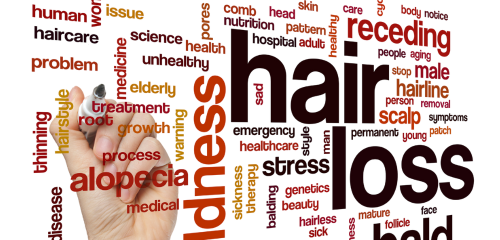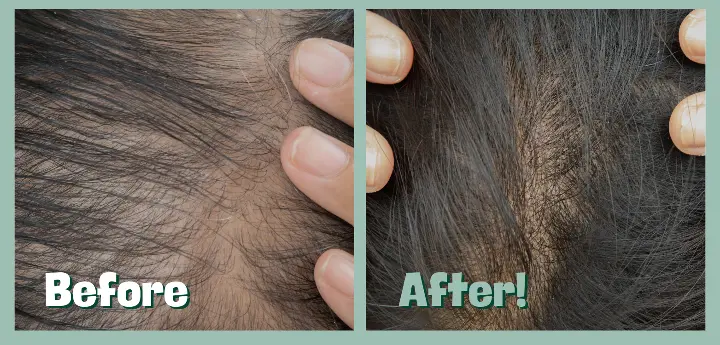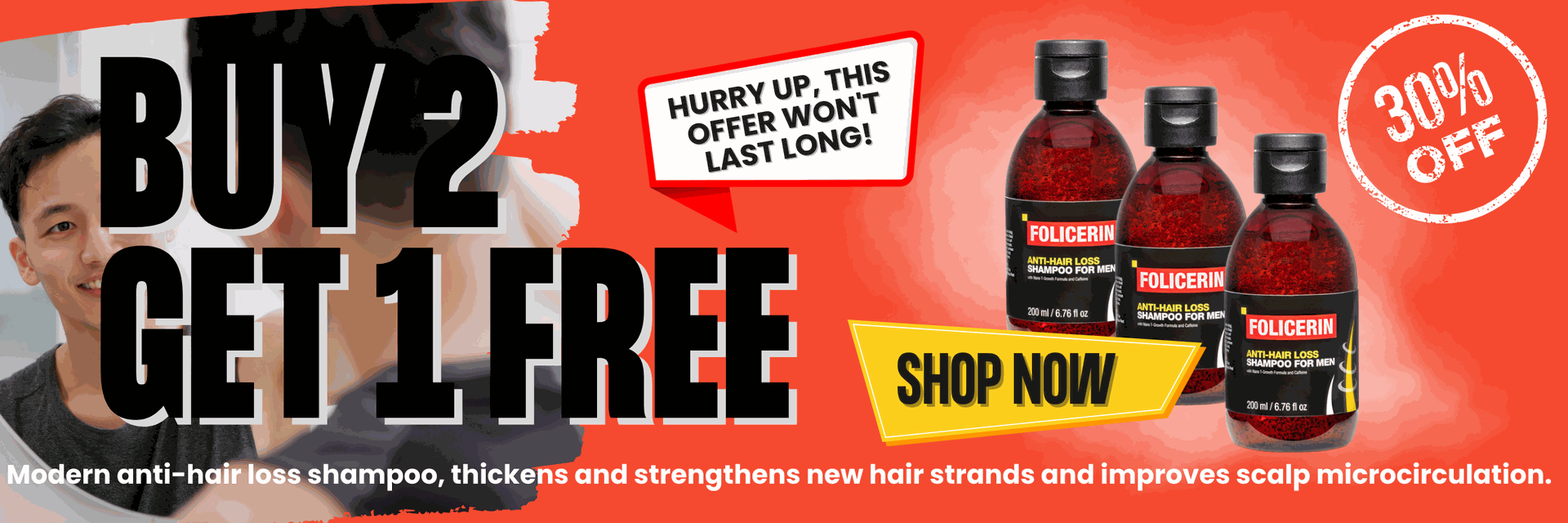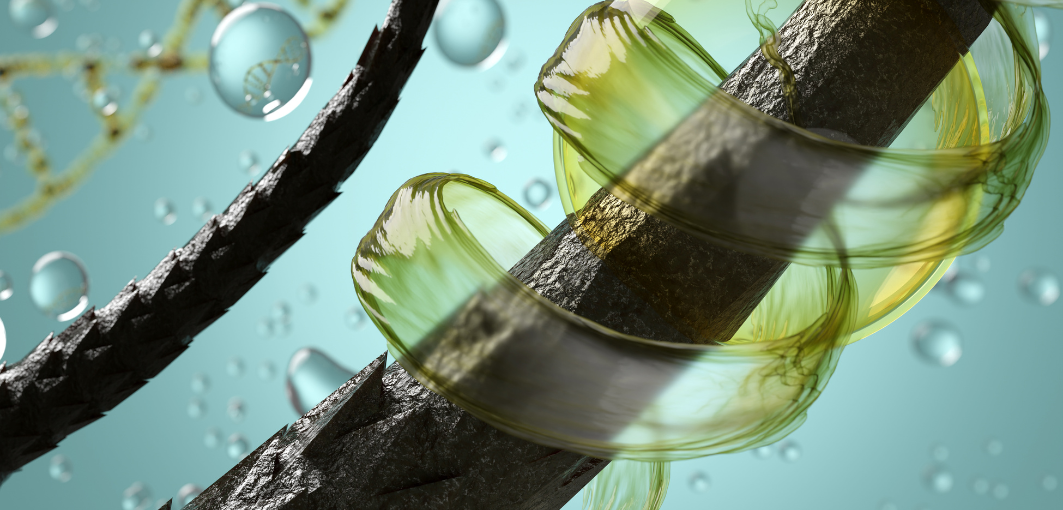Hair loss is an increasingly common concern for both men and women, especially as we age. While for some it may be a natural part of getting older, for others it can be a source of anxiety and frustration. The good news is that there are ways to slow down and even reverse hair loss. Although there are many underlying causes, there are also numerous strategies to maintain hair health and promote hair growth. This article will guide you through the causes of hair loss, how to make lifestyle changes, and explore the benefits of natural ingredients in products like Folicerin, a shampoo formulated to combat this issue.
Understanding Hair Loss
Why Does Hair Loss Occur?
Hair loss is multifactorial, meaning it can be due to a combination of several factors. As we age, these causes may intensify, leading to increased hair shedding. Let’s look at some of the most common reasons:
· Genetics and Androgenetic Alopecia: Genetics play a major role in hair loss. Androgenetic alopecia, also known as male or female pattern baldness, is the most common cause. In men, this type of hair loss manifests as a receding hairline and thinning at the crown, while in women, thinning primarily occurs at the top of the scalp.
A study published in Nature Communications identified multiple genes responsible for androgenetic alopecia. These genes are associated with hair follicles’ sensitivity to hormones like dihydrotestosterone (DHT), which causes follicle weakening and miniaturization.
· Hormonal Changes and DHT: Hormones play a crucial role in hair loss. Specifically, DHT (dihydrotestosterone), a derivative of testosterone, has been identified as a leading cause of hair loss in both men and women. DHT binds to receptors in hair follicles, shrinking them and eventually preventing them from producing healthy hair.
Studies such as those conducted by The Journal of Clinical Endocrinology & Metabolism have shown that inhibiting the enzyme 5-alpha-reductase, which converts testosterone to DHT, is key to halting hormone-related hair loss.
· Stress: Stress can trigger a condition called telogen effluvium, where more hair than usual enters the resting phase and sheds prematurely. Stressful events can be emotional, physical (such as serious illness), or environmental, and this type of hair loss is temporary, though it may become chronic if not properly managed.
· Nutritional Deficiencies: Diet plays an important role in hair health. The lack of essential vitamins and minerals, such as iron, zinc, and B vitamins, can contribute to hair thinning. Extreme, low-protein diets may also result in long-term hair loss.
A study published in Dermatology Practical & Conceptual demonstrated that individuals with deficiencies in iron, zinc, and vitamin D tend to experience more hair loss, highlighting the importance of a balanced diet for maintaining a healthy scalp.
· Environmental and Lifestyle Factors: Excessive use of chemical products, exposure to pollutants, and the overuse of heat styling tools can weaken hair and lead to eventual loss. Additionally, smoking reduces blood flow to the scalp, which may impair hair health.

Symptoms of Hair Loss
Symptoms of hair loss can vary, but the most common include:
- Gradual thinning at the top of the head.
- Bald spots on the crown or temples.
- Excessive shedding when brushing, washing, or handling hair.
- The appearance of fine or weak strands.
Strategies to Stop Hair Loss
Lifestyle Changes
Stopping hair loss starts with implementing key lifestyle changes. These changes not only contribute to hair health but also improve overall well-being.
- Healthy Diet
A nutrient-rich diet is essential for maintaining healthy hair. Here are some key nutrients to include in your diet to strengthen hair:
· Proteins: Hair is primarily composed of keratin, a structural protein. Without enough protein in your diet, hair may become weak and lose its thickness. Foods like chicken, fish, eggs, legumes, and nuts are excellent sources of protein.
A study in the Journal of Nutrition indicates that protein deficiency can cause noticeable hair thinning and, in severe cases, trigger hair loss.
· Vitamin C: Vitamin C is vital for the production of collagen, an essential protein that strengthens blood vessels that nourish the hair follicles. Additionally, this vitamin helps the body absorb iron, a crucial mineral for hair growth.
In a study by The American Journal of Clinical Nutrition, researchers found that low levels of vitamin C are associated with slow hair growth.
· Iron: Iron deficiency is one of the most common causes of hair loss, particularly in women. Iron helps red blood cells carry oxygen to hair follicles, promoting their health.
· Omega-3 Fatty Acids: Omega-3 fatty acids have anti-inflammatory properties and promote scalp health by hydrating and strengthening hair follicles. Salmon, sardines, flaxseed, and walnuts are excellent sources of omega-3.
A study in Journal of Cosmetic Dermatology found that omega-3 supplementation resulted in a significant improvement in hair density and thickness.
- Adequate Hydration
Drinking enough water is essential for maintaining a healthy scalp. Proper hydration ensures that hair follicles receive the necessary nutrients through the bloodstream. Lack of water can cause scalp dryness and increase hair fragility.
- Regular Exercise
Exercise not only benefits the body but also plays a key role in hair health. It stimulates blood circulation, ensuring that the scalp and follicles receive oxygen and essential nutrients.
· Cardiovascular Exercise: Aerobic exercise improves circulation throughout the body, including the scalp. Activities like walking, running, or swimming can enhance hair health in the long run.
· Stress Reduction: Exercise releases endorphins, which are known to reduce stress levels. By reducing stress, you also help prevent hair loss induced by telogen effluvium.
- Stress Management Strategies
Managing stress is crucial to preventing hair loss. Practicing activities such as meditation, yoga, and deep breathing can help keep stress under control.
- Cognitive Behavioral Therapy (CBT): CBT is an effective technique for addressing chronic stress. Many studies have shown its effectiveness in reducing anxiety symptoms, which are often associated with hair loss.
Hair Care Products
Nano T-Growth Hair: An Innovative Product
Folicerin shampoo is an advanced and natural solution designed to combat hair loss. It uses innovative nanovector technology to ensure the stability and penetration of its active ingredients, providing long-lasting results.
Benefits of Nano T-Growth Hair:
· DHT Inhibition: Contains black pepper extract, which helps block the enzyme 5-alpha-reductase, reducing DHT production. This action prevents follicle miniaturization.
· Growth Stimulation: Ginseng and licorice in the formula stimulate hair growth by improving circulation and strengthening hair follicles.
A study in The Journal of Ginseng Research showed that ginseng promotes hair regeneration and prolongs the growth phase (anagen) of the hair cycle.
Improves Scalp Health: Ingredients like burdock and green tea have anti-inflammatory properties that calm and balance the scalp, essential for creating a healthy environment for hair growth.


Essential Oils
Essential oils are another promising natural remedy for stopping hair loss. Some oils, such as rosemary and peppermint, have shown clinical effectiveness in stimulating hair growth.
· Rosemary Oil: A study in SKINmed revealed that rosemary oil can be as effective as minoxidil in treating androgenetic alopecia without the side effects.
Peppermint Oil: A study in Toxicological Research showed that peppermint oil improves circulation in the scalp and stimulates hair growth.
Nutritional Supplements
In addition to a balanced diet, certain supplements can be helpful in promoting hair health. Among the most recommended are:
· Biotin: This B vitamin is crucial for keratin production and has been shown to promote hair growth in people with deficiencies.
A study published in The Journal of Clinical and Aesthetic Dermatology found that biotin supplements significantly improved hair growth in women with thinning hair.
· Collagen: Collagen is a protein that strengthens hair follicles, promoting hair growth and reducing breakage. It also improves scalp elasticity, helping to maintain strong, healthy hair.
Medical Treatments
Minoxidil
Minoxidil is one of the most well-known treatments for hair loss. This topical medication improves blood flow to the scalp, nourishing the follicles and prolonging the growth phase of the hair.
Finasteride
Finasteride is another common medical treatment, especially for men with androgenetic alopecia. It works by inhibiting DHT production, reducing the hormonal impact on hair follicles.
Laser Therapy
Low-intensity laser therapy has been shown to be effective in stimulating hair growth. This non-invasive treatment improves scalp circulation and prolongs the hair growth phase.
In Summary...
Stopping hair loss is possible when addressing underlying causes and adopting lifestyle changes along with appropriate treatments. From improving your diet, incorporating exercise, and managing stress to using advanced products like Nano T-Growth Hair, there are multiple ways to strengthen your hair and promote its growth. Strategies based on natural ingredients and sustainable changes not only benefit your hair but also enhance overall health.

If you're looking for a complete and effective solution, try Folicerin and begin your journey towards stronger, healthier hair. Share this article to help others discover natural solutions for hair loss! Visit our recommended products section.